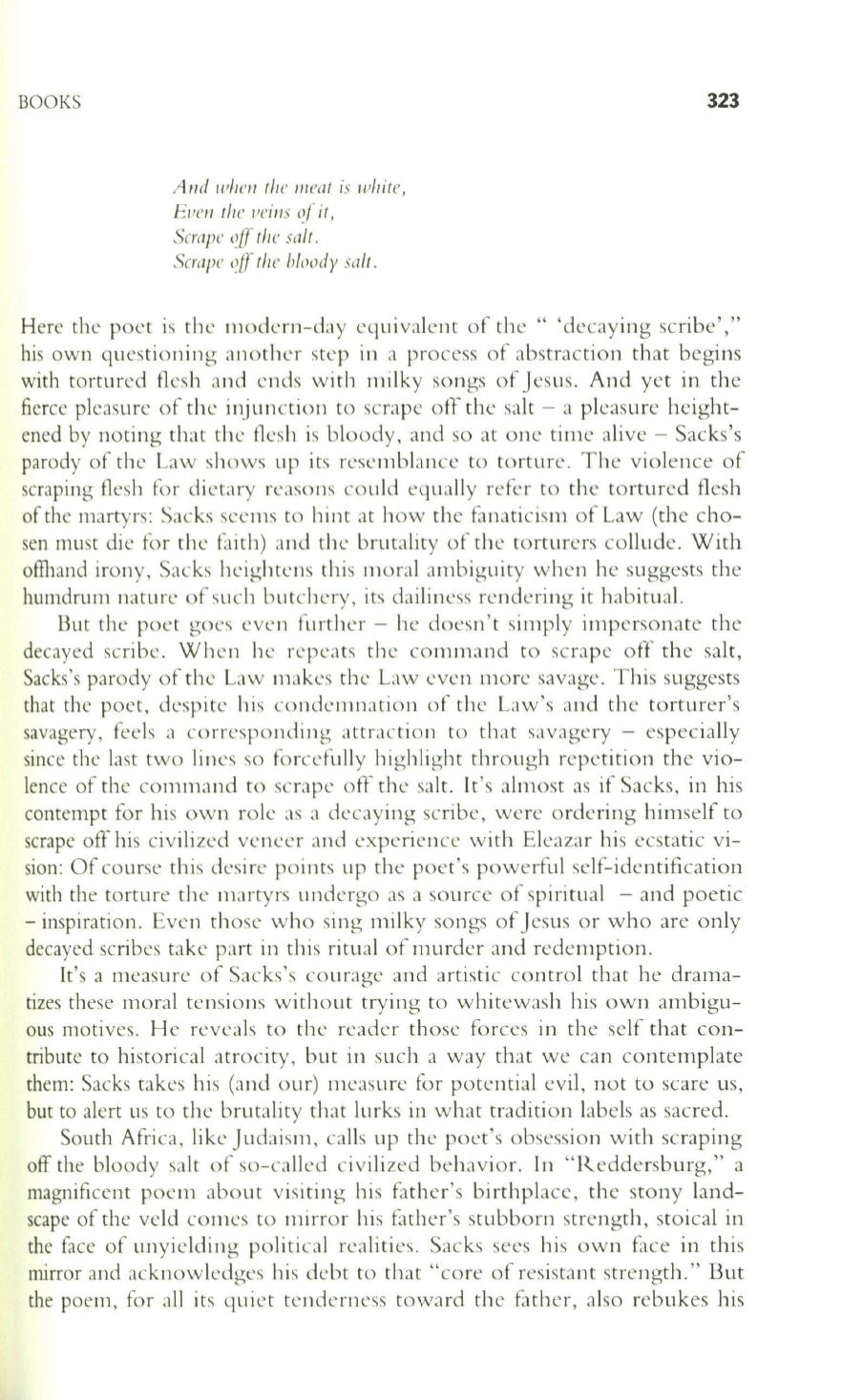
BOOKS
A lld Ilihell the lIIeat is ",hite,
Ellell the IleillS
of
it ,
Scrape
,!/f
the salt .
Scrape
'~fJ
the
bloody
salt .
323
Here the poet is the m ode rn-day equivalent o f the" 'decaying sc ribe ' ,"
his own qu esti o nin g ano th er step in a process of abstrac ti o n th at begins
with tortured fl es h and ends with milky songs o f j es us. And yet in the
fierce pleasure o f the injun cti o n to sc rape o fT the sa lt - a pl easure height–
ened by noting th at the fl es h is bl oody, and so at o ne time alive - Sac ks' s
parody of the Law sho ws up its resembl ance to to rture. T he vi o lence of
scraping fl es h fo r di etary reasons could equ ally refe r to th e to rtured fl esh
of the martyrs: Sac ks seems to hin t at how th e fa nati cism o f Law (the cho–
sen must di e fo r the fa ith) and t he brutality o f the to rture rs collude. With
offhand iro ny, Sacks heightens thi s mo ral ambi guity when he suggests the
humdrum nature of such butchery, its dailiness rende ring it habitual.
But th e poe t goes eve n furth e r - he does n ' t simpl y impe rsonate the
decayed sc rib e . When he repea ts th e cO lllmand to sc rape off the salt ,
Sacks's parody o f the Law makes th e Law even mo re sa vage. This suggests
that the poet, d espite hi s co ndemnati o n o f th e Law 's and th e to rturer's
savage ry, feel s a co rrespo ndin g attrac ti o n to th at savage ry - especially
since the last two lin es so fo rcefull y hi ghlight thro ugh repetiti o n the vio–
lence of the command to sc rape o ff the sa lt. It's almost as if Sac ks, in his
contempt fo r hi s own ro le as a decay ing sc ribe, w ere o rd e ring himself to
scrape off his civili zed ve nee r and expe ri ence w ith Eleaza r hi s ecstati c vi–
sion:
Of
course thi s desire po ints up the poet's pow e rful self-identifi cation
with the torture th e martyrs undergo as a source o f spiritual - and poeti c
- inspirati o n. Eve n th ose wh o sin g milky songs o f j es us o r w ho are o nly
decayed scribes take part in thi s ritu al o f murder and redempti o n .
It's a meas ure o f Sacks's courage and arti sti c contro l th at he drama–
tizes these moral te nsio ns with o ut trying to whitewas h hi s own ambigu–
ous motives. H e revea ls to th e reade r th ose fo rces in th e self that con–
tribute to histo ri ca l atrocity, but in such a w ay that w e ca n contemplate
them: Sacks takes his (a nd o ur) meas ure fo r po tenti al evil , no t to sca re us,
but
to
alert us to the brutality that lurks in what traditi o n labels as sac red .
South Afri ca, like judaism , ca lls up the poet's o bsessio n w ith scraping
off the bloody sa lt o f so- ca ll ed civili zed behavio r.
In
" R eddersburg," a
magnifi cent poem abo ut visitin g hi s fa th e r's birthpl ace, th e sto ny land–
scape of the veld cOlli es to mirro r hi s fa ther's stubbo rn strength , stoi cal in
the face of un yieldin g po liti ca l rea liti es. Sacks sees hi s own face in this
mirror and ackn owl edges hi s debt to th at "core o f resistant strength." But
the poem, for all its quiet tende rn ess toward th e father, also rebukes his


